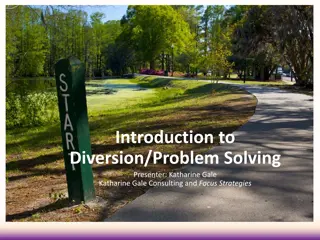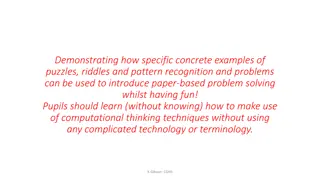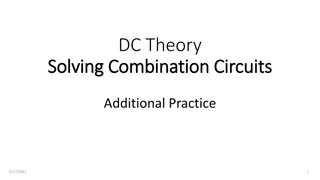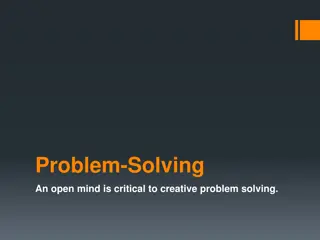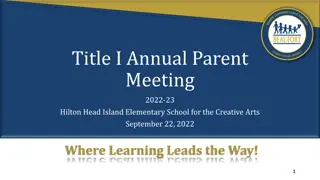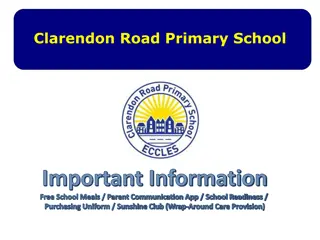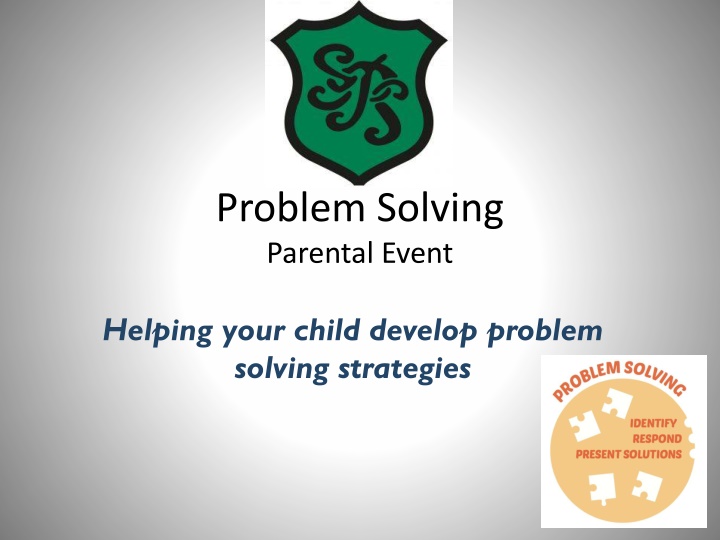
Helping Children Develop Problem-Solving Skills
Empower your child's problem-solving abilities through engaging activities like playing board games, completing puzzles, and counting money. Encourage their numeracy skills development at early and first levels to prepare them for future success in learning and life.
Download Presentation

Please find below an Image/Link to download the presentation.
The content on the website is provided AS IS for your information and personal use only. It may not be sold, licensed, or shared on other websites without obtaining consent from the author. If you encounter any issues during the download, it is possible that the publisher has removed the file from their server.
You are allowed to download the files provided on this website for personal or commercial use, subject to the condition that they are used lawfully. All files are the property of their respective owners.
The content on the website is provided AS IS for your information and personal use only. It may not be sold, licensed, or shared on other websites without obtaining consent from the author.
E N D
Presentation Transcript
Problem Solving Parental Event Helping your child develop problem solving strategies
Everyone CAN be good at solving numeracy problems Pupils Parents Staff Everything we do in school should help our children to develop skills for learning, life and work. Problem Solving is a life skill. Numeracy is about being able to understand and use numbers in a range of situations, for example when solving problems or making decisions in situations involving numbers. With increased experience of problem solving, pupils should be able to develop their thinking skills, develop characteristics such as persistence and willingness to have a go and acquire a toolkit of strategies. They should gain increasing confidence in approaching unfamiliar situations and this should help them in everyday situations out-with the classroom.
My learning in numeracy and mathematics problem solving enables me to: develop a secure understanding of the concepts, principles and processes of mathematics and apply these in different contexts, including the world of work engage with more abstract mathematical concepts and develop important new kinds of thinking understand the application of mathematics, its impact on our society past and present, and its potential for the future develop essential numeracy skills which will allow me to participate fully in society interpret numerical information appropriately and use it to draw conclusions, assess risk, and make reasoned evaluations and informed decisions apply skills and understanding creatively and logically to solve problems, within a variety of contexts appreciate how the imaginative and effective use of technologies can enhance the development of skills and concepts.
EARLY LEVEL Play board games Completing a jigsaw Laying the table Pairing up the socks Telling the time Paying for items Counting pocket money, Packing a school bag, Constructing a model using Lego or other construction material Counting down the days to a special event. Knowing their birthday.
FIRST LEVEL Sequencing of family birthdays, days of the week and months of the year. Making dens indoor and outdoors planning and gathering resources. Playing board games which require using a strategy (Connect 4, Chess) Working out simple durations in everyday life. How long until school starts? How long is the train ride to Edinburgh? Online games or apps. Solving problems using household items e.g. doubling up a recipe Preparing a meal.
SECOND LEVEL Helping out with the weekly shop Planning their week homework tasks, after school clubs, screen time Using a diary or a calendar. Playing age appropriate board games (e.g. chess, Battleships) Online games Planning a holiday Making models Baking or changing a recipe (prepare for 8 instead of 4) Writing number problems for others
Skills for Learning, Life and Work At all levels: Let children work things out themselves - don t always be there to give the answer. Praise their independence. Ask What if ? . This extends thinking and promotes reasoning, a key skill in problem solving. e.g. I need 80p for the bus fare, but I can only find 35p. How much more do I still need to find? Involving your child in discussions about everyday number problems. We have to be at swimming lessons by 5pm, do we have time to do the shopping before then? Encouraging perseverance and celebrating the effort they have gone to stick with it .
Useful links Youcubed A fantastic site, run by Stanford University s Professor Jo Boaler. A well organised site, filled with resources for teachers, parents and pupils, on how to raise children s confidence in maths and numeracy. www.youcubed.org Nrich A site set up by Cambridge University to provide a resource filled with high quality puzzles, investigations and advice about problems solving in maths and numeracy. This site is used widely in classrooms across the cluster. www.nrich.maths.org Making Maths Count Report published by Scottish Government earlier this year, with focus on development of positive public attitude to maths, providing high quality learning and teaching in schools and preparing a for employment. http://www.gov.scot/Resource/0050/00505348.pdf Parentzone Scotland This site gives parents ideas on how to help children to apply their learning to daily life. https://education.gov.scot/parentzone/learning-at-home/supporting-numeracy

